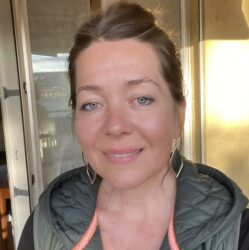“Hold the vision, trust the process.” – Author unknown
When I emerged from my lifelong slumber, it involved reconnecting with my inner voice. Initially, it was difficult to hear amidst the cacophony of my racing thoughts and deep-seated fears. At times, the noise was overwhelming, akin to a swarm of hornets drowning out the voice within me. The pivotal moment came when I started questioning, “Who am I amidst this sea of thoughts? Why do I think and feel the way I do? What shapes my convictions and fearful thoughts that color my perception of reality? And why do I struggle with insecurities when it comes to making decisions and trusting my inner voice?” This realization made me understand that I held the power to shape my reactions. Despite occupying the driver’s seat of my own life, capable of molding my perception and response to experiences, I had allowed myself to become a victim of those very experiences. This realization compelled me to embark on a journey of self-discovery, recognizing that I could no longer afford to leave these unanswered questions unresolved.
Although I grasped the principle that I am not defined by my thoughts, fears, and beliefs, I encountered a challenge in formulating an ideal vision for myself. Instead, I found myself fixating on problems, inadvertently granting them more power than the solutions themselves. I had grown accustomed to the feeling of lacking. For instance, I firmly believed that my mother was the source of my self-doubt and dissatisfaction with my appearance. I entertained thoughts that my past partners did not value me because I lacked intelligence. I even questioned, “Who would employ me without proper education?” I supplied myself with countless reasons to feel unhappy and inadequate.
As a child, I experienced a lack of emotional support in the form of compliments and validation. Over time, I came to believe that I did not deserve it. Consequently, I adopted a mindset of accepting whatever came my way, fearing that asserting myself would lead to conflict and trouble. The notion of being a “good girl” resonated with me since it promised love and affirmation. This perception was reinforced by my mother and other caretakers who praised me for avoiding trouble. I held the misconception that as long as I maintained that persona, life would be problem-free. By suppressing my self-expression, I unwittingly relinquished the power to make decisions in my best interest, allowing others to make choices on my behalf. Unfortunately, these decisions did not always align with my well-being.
Fear exerts a suffocating influence. My sister once told me, “The only wrong decision is taking no decision.” The mere act of taking a step forward brings about change. However, I believe that change itself frightened me. I had long been fearful of embarking on a journey towards independence, assuming the responsibility of determining my own desires. I was afraid of disrupting the status quo and dealing with the potential reactions it might trigger. But what underlies this fear?
Depending on how our childhood experiences unfolded, we form connections to various issues such as relationships, money, and success. Over time, our identities take shape, shaped by the beliefs we hold about people and events. For instance, a child from a poor background may harbor more negative views about relationships and money compared to a child from a wealthy family. In my own story, certain experiences took a toll on my self-esteem. It was challenging to let go of an identity that had felt familiar for so many years. This is how the psyche operates—we seek answers for every experience, and those answers provide us with a semblance of security. Consequently, we become attached to that sense of security, whether it is genuine or not. These experiences form our identities, and relinquishing that identity begs the question: What will remain? Who will mend the pain and trauma I have endured? Who will fill the void left behind? I had grown accustomed to lamenting all the unfavorable events around me, relying on external circumstances to make myself feel “whole” and keep going. Thus, I feared change because I could not envision what would sustain me without the security of my previous identity.
“Most people wait for something outside of them to change how they feel inside.” – Joe Dispenza
If we desire change and wish to manifest our inner visions in life (as we all possess them), we must first understand what we truly want. It can be a process in itself to realize that we deserve what we aspire to. The challenge lies in articulating those desires. Often, the answers lie within us, but we struggle to trust our inner voice. Over time, we have lost the connection and become disconnected from our instincts. Instead, we listen to the opinions of others, losing touch with our own inner direction. Consequently, we navigate through life without daring to dream big.
What happens when we undervalue ourselves? We settle for breadcrumbs, becoming addicted to the slightest signs of love we receive. This stems from a lack of understanding our self-worth. We compare ourselves to others and believe that external fulfillment will bring about the change we seek. While it may offer temporary solace, unless we transform our internal thoughts and feelings, no romantic relationship or amount of wealth can sustain long-term happiness.
Moreover, everything in life is subject to potential loss. How would we feel then? Personally, I was once terrified of losing the meager crumbs of affection and acceptance—love—I had in my life.
“Those that go searching for love only make manifest their own lovelessness, and the loveless never find love, only the loving find love, and they never have to seek for it.” – D.H. Lawrence
Without internal change or a shift in our beliefs ingrained from childhood, nothing in this world can truly bring us lasting happiness. External changes are futile without inner transformation.

